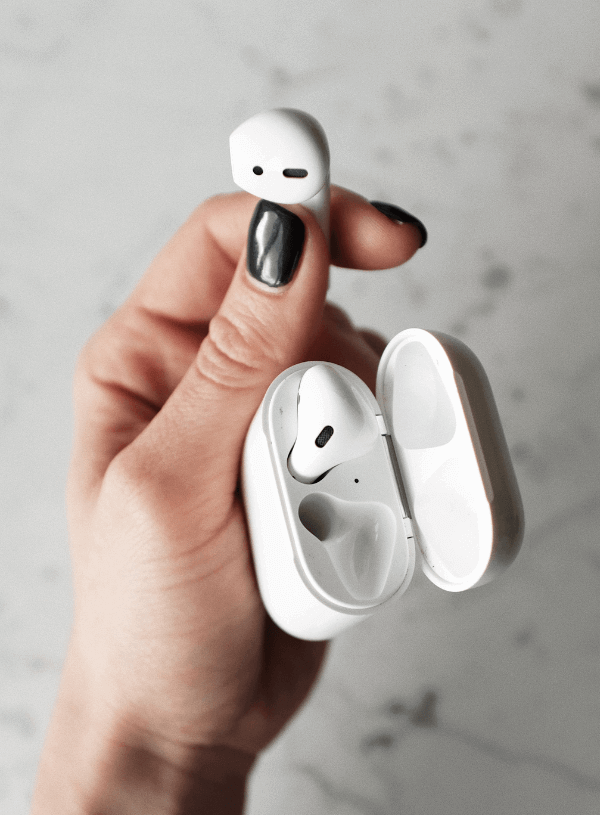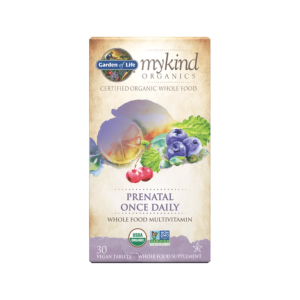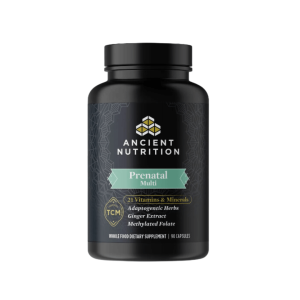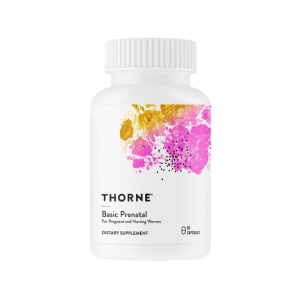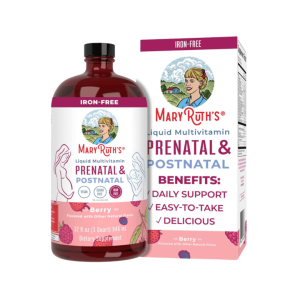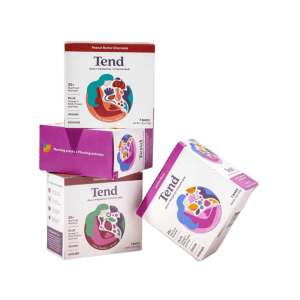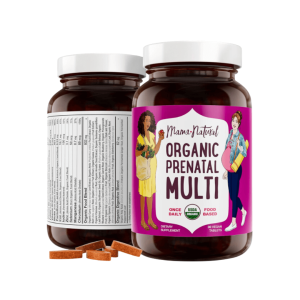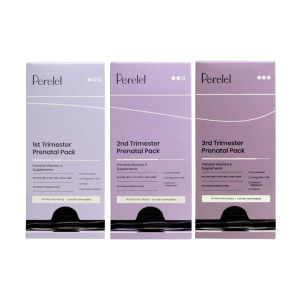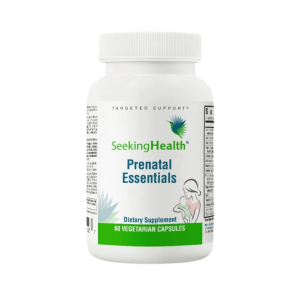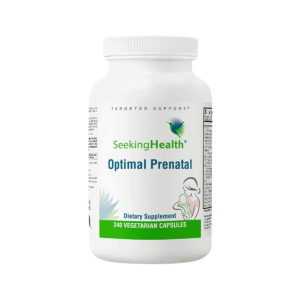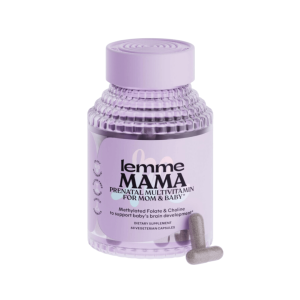Proper nutrition is an essential part of having a healthy pregnancy. There are essential nutrients you need to keep yourself nourished and to grow a healthy baby. This is why it’s critical to take a high-quality prenatal vitamin (before you get pregnant during your preconception phase too). So, what are the best organic prenatal vitamins for 2024? How can you find the best natural prenatal supplements? When should you start taking one?
Keep reading to learn more!
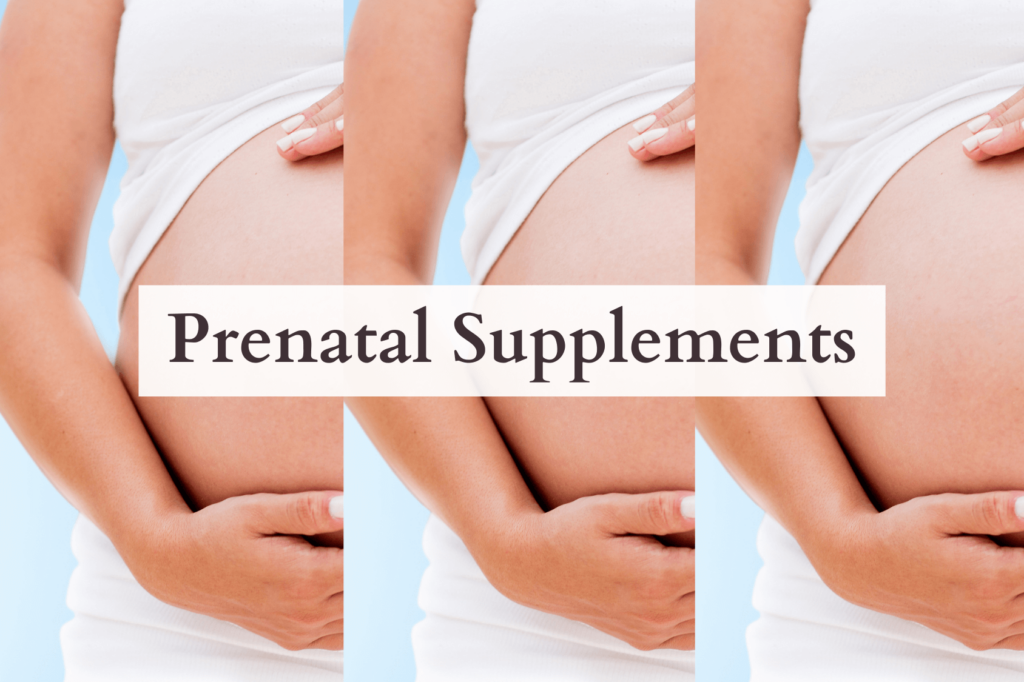
Note: This article contains affiliate links, meaning In On Around will make a small commission at no additional cost to you. This helps us maintain the site. As always, we value full transparency & only work with brands we love and trust.
Author: In On Around Founder & CEO, Catherine Power.
Article medically reviewed by: Dr. Ana Engelhardt.
- Published On: March 19, 2024
- Post Updated: April 29, 2024
Summary:
- Choosing a prenatal that’s right for you requires bloodwork with your doctor. What works for you, may not work for someone else… so test, don’t guess! Test for which nutrients you need.
- Opt for methylated folate (not synthetic folic acid) and ensure your prenatal contains the right levels of choline, iron, iodine, and other vitamins & minerals.
- Great option (depending on your bloodwork): WeNatal
Table of Contents
Why Organic Prenatal Vitamins Matter
When you’re pregnant, you want to support your body in the best way possible to grow a healthy and happy baby. This is why it’s important to opt for prenatal vitamins that are made naturally without unnecessary synthetic additives, pesticides, or genetically modified organisms (GMOs). Organic vitamins provide an option for mothers to reduce exposure to potentially harmful chemicals that could affect their health of their baby. Instead of primarily synthetic forms of vitamins, organic supplements include nutrients found from mostly whole food sources.
Ultimately, opting for natural organic prenatal vitamins or supplements while pregnant can improve your well-being and your child’s during this important phase of life.
To learn more about GMOs, check out this article: 13 Pros And Cons Of GMOs (Backed By Evidence)
Prenatal Vitamin vs. Multivitamin – What’s The Difference?
When shopping for vitamins, you’ll see both prenatal and multivitamins available on the shelf… but what are the main differences?
Well, to start, prenatal vitamins are targeted specifically for the needs of mothers and their growing babies. When pregnant, it’s common to need a higher number of certain vitamins and minerals, like folic acid, iron, and calcium. Organic prenatal supplements are focused on supporting the needs of mothers and babies during this crucial period of development and growth. Multivitamins, on the other hand, are targeted at the general public for their daily nutritional needs.
Keep in mind that multivitamins should NOT be used by everyone. At In On Around, we believe it’s best to get targeted bloodwork to see what vitamins and minerals your body specifically needs more of. Work with your doctor and test – don’t guess!
If you’re looking for specific supplements, check out the In On Around Shop.
Prenatal Vitamins | Multivitamins | |
Purpose | Specifically formulated for pregnant and nursing mothers. Helps to address nutritional needs while pregnant. | Designed for general adult dietary supplementation. Helps to fill in nutritional gaps for everyday use. |
Nutrient Content | Higher levels of certain nutrients essential for healthy baby development, like folic acid, iron, and calcium. | Contains a wider spectrum of vitamins and minerals. It’s not specific for maternal or fetal health. |
Target Audience | Prioritizes nutrients critical for mothers and babies. | Typically suitable for a wide variety of people looking to generally improve their wellbeing. |
What To Avoid In Prenatal Vitamins
It’s best to avoid unnecessary additives in your prenatal supplement. You want to fuel your body with the highest quality out there within your budget! As always, confirm this with your doctor, but it’s best to avoid:
- Synthetic Folic Acid
- Up to 40-60% of the population can’t process folic acid. Opt for methylated forms of folate instead.
- Added sugar, like high fructose corn syrup
- Silicon dioxide
- Gluten – Learn more about gluten here: Gluten-Free Diet Pros And Cons For Non-Celiacs
- Genetically modified organisms (GMOs) – Learn more about GMOs here: 13 Pros And Cons Of GMOs (Backed By Evidence)
- Artificial sweeteners
- FD&C dyes and colors
- Prenatals with doses that are too low
Should Prenatal Vitamins Contain DHA?
Understanding the Benefits of Organic Ingredients for Maternal and Fetal Health
Organic ingredients are cultivated without synthetic pesticides, herbicides, or fertilizers, reducing the risk of harmful chemical exposure to both mother and baby. Choosing organic prenatal supplements ensures a higher concentration of essential nutrients while minimizing potential toxins, promoting a healthier pregnancy, and potentially reducing the risk of complications.
Prioritizing organic options aligns with a commitment to optimal maternal and fetal well-being, providing peace of mind for expectant mothers.
Understanding the Benefits of Organic Ingredients for Maternal and Fetal Health
First and foremost, any prenatal supplement should have adequate third-party testing to back up its products. Ideally, brands should share the third-party test results publicly, especially for heavy metal testing.
When shopping for a high-quality organic prenatal vitamin, make sure to look for the following:
- Active form of folate 5-MTHF
- Iron – Pregnant women need at least double the amount of iron compared to non-pregnant women.
- Calcium
- Many supplements have low levels of calcium since it can interfere with iron absorption
- Iodine (~150 mg)
- Choline (400+ mg)
- Vitamin C
- Vitamin A (up to a certain amount) [4]
- Vitamin D
- Vitamin B6
- Vitamin B12
- Gluten-free
- Omega-3 fatty acids (or you can take this as a separate supplement)
Some foods (like grain products, cookies, bagels, etc…) can be fortified with folic acid – keep this in mind if you’re trying to avoid it in its synthetic form.
What To Eat When Trying To Conceive
Keep it simple: eat real, organic whole foods as much as possible. Eat a diet rich in organic leafy green vegetables and high-quality foods that are high in folate, like:
- Beans, lentils, and other legumes like black-eyed peas
- Spinach and other leafy greens
- Asparagus
- Brussels sprouts
- Broccoli
- Turnip greens
- Nuts and seeds, like walnuts, peanuts, and flax seeds
- Beets
- Bananas
- Avocado
- Citrus fruits
- Beef Liver – Learn more: Beef Liver Nutrition – Are Organ Meats Healthy?
- Beef liver contains high amounts of Vitamin A, so don’t go overboard and talk to your doctor.
- Peanuts
- Pasture-raised organic eggs – Learn more: Best Eggs To Buy: Pasture-Raised, Free-Range, Or Cage-Free?
It's important to maintain a well-balanced healthy diet.
Folate vs. Folic Acid – What’s Better?
Folic acid is the man-made synthetic version of folate.
Folate, also known as Vitamin B9, is an essential water-soluble vitamin required for fetal growth and the reduction of birth defects. [5] It’s essential for neural tube closure (necessary for brain and spine development).
It’s been shown that some high doses of folic acid might increase the risk of colorectal cancer in some people. [6]
In our opinion, taking a safe conventional prenatal vitamin on the market is better than not taking one at all. Ensuring that you and your baby have the proper nutrients is priority number one.
The MTHFR Gene
Not everyone can metabolize folic acid. If you have a genetic mutation on the MTHFR gene (methylenetetrahydrofolate reductase), it can impact your ability to change folic acid into folate. In fact, about 30-40% of people have this gene! This is really important to note, especially if you’re trying to get pregnant or plan to become pregnant in the future.
You don’t necessarily need to test if you have the MTHFR gene. Instead, just switch to a better prenatal that doesn’t use synthetic folic acid.
Pregnant women need 5 to 10 times more folate than women who aren’t pregnant. [7]
When To Start Taking A Prenatal Vitamin Before Conceiving
Many healthcare providers recommend starting a prenatal supplement at least a month before getting pregnant. Other doctors recommend three to six months before conceiving. As a rule of thumb, in our opinion, it’s best to start taking an organic prenatal vitamin at least three months before trying to conceive but talk to your doctor first. This is not medical advice.
Top Picks: The Best Organic Natural Prenatal Vitamins of 2024
As always, this is not medical advice – be sure to chat with your OBGYN or doctor before consuming any supplements. We are all bio individual and we have different nutritional needs based on our bloodwork, so many sure that you’re choosing the best organic prenatal vitamin for your specific needs.
[Use this link to get a free DHA supplement with your WeNatal order]
This is our TOP pick, but your nutritional needs are special to you, so speak with your doctor to confirm the best option.
- Uses Folate as Ca-5MTHF; Magnafolate-Pro (1350 mcg)
- Includes a mixture of Vitamin A, C, D, E, K, B6, B12 and more.
- Includes inositol which can help with blood sugar balance and ovarian health
- They sent me their COA results for each of their products with heavy metal test results. For their “For Her” prenatal, it showed:
- Lead: 0.145 ug/serving
- Arsenic: 0.106 ug/serving
- Cadmium: 0.054 ug/serving
- Mercury: 0.006 ug/serving
- Serving Size: 3 capsules
- Cons:
- Their main prenatal doesn’t contain Omega-3 fatty acids, but they do offer a separate prenatal omega DHA+ fish oil supplement that’s wild-caught.
- Contains a lot of Vitamin A (2200 mcg RAE), which may not be appropriate for everyone, especially if you’re eating beef liver – talk to your doctor!
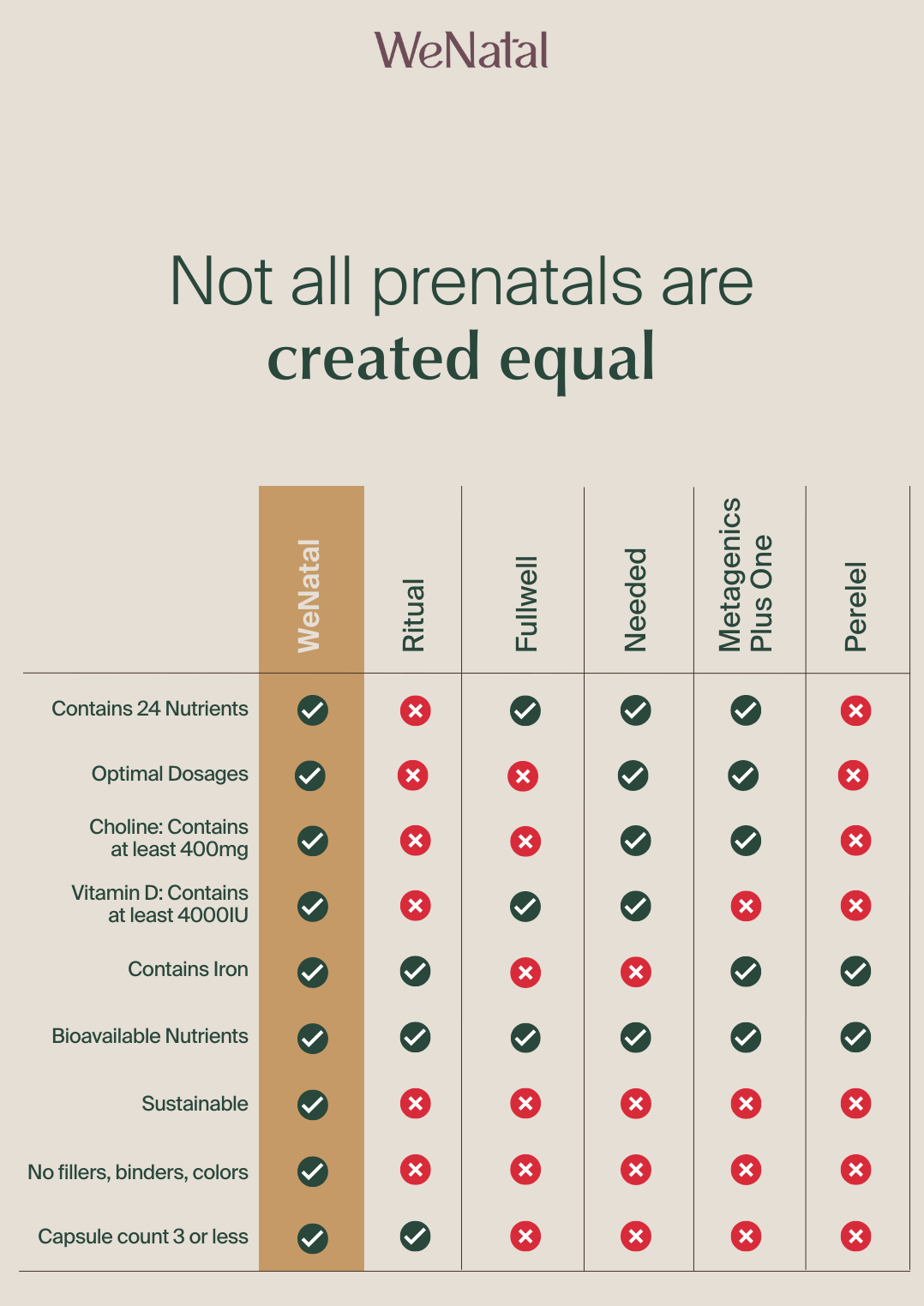
- Folate as L-methylfolate, glucosamine salt (918 mcg DFE, 551 mcg folate)
- They sent me their Certificate of Conformance for a recent manufacturing run:
- Lead: <0.5 mcg/day
- Arsenic: <10 mcg/day
- Cadmium: <4.1 mg/day
- Mercury: <0.3 mg/day
- Serving Size: 8 capsules
- Cons:
- Requires a lot of capsules taken per day – but they do offer a powder version as well!
- Doesn’t contain iron, but they offer a separate iron add-on. Talk to your doctor to see what you need.
- Uses Folate as Metafolin calcium L-5-methyltetrahydrofolate (1,360 mcg DFE, 800 mcg)
- Tested for glyphosate + didn’t detect any
- Shares the heavy metal test results directly on their website:
- Lead: 0.185 mcg/Serving Size
- Arsenic: 0.137 mcg/Serving Size
- Cadmium: 0.0856 mcg/Serving
- Mercury: <0.0150 mcg/Serving
- Serving Size: 3 pills
- Cons:
- Contains silicon dioxide
- Comes in a mint and citrus flavoring
- Includes methylated folate as 50MTHF (1000 mcg)
- Includes Omega-3 DHA (350 mg)
- Focuses on just 12 nutrients – it could be a good option for those who have a well-balanced diet, a diet already high in calcium (which is an essential nutrient during pregnancy), or who prefer incorporating other supplements
- They refused to share their COA heavy metal test results, but they are NSF-certified, third-party tested, and compliant with Prop 65 levels of:
- Lead: 0.5 mg/day
- Arsenic: 10 mg/day
- Cadmium: 4.1 mg/day
- Mercury: 0.3 mg/day [8]
- Serving Size: 2 capsules
- Cons:
- It’s not a full multivitamin: it doesn’t include Calcium, Vitamin A, Vitamin C, a few B vitamins, Zinc, etc… Talk to your doctor.
- This can be an option for someone who wants just the basics – but it may not fulfill the needs of everyone.
The best prenatal vitamin is one that you will actually take! One that your pregnant stomach can tolerate.
Prenatal DHA Supplement
If your prenatal doesn’t contain omega-3 DHA (at least 200 mg), talk to your doctor about supplementing with a high-quality fish oil, like Nordic Naturals Prenatal DHA.
Prenatal Vitamins for Men
Folate is important for male fertility, too! Adequate folate levels in men are associated with healthier sperm, including improved sperm count and motility. It’s recommended for men to ensure they have sufficient folate intake to support reproductive health.
There are a couple of supplements on the market targeted towards male fertility, like WeNatal (for Him) and Seeking Health Optimal Man.
Better Brands
Here are some “better” prenatal options (not “best”). These “better” brands don’t contain some ingredients that aren’t necessary in prenatal vitamins or didn’t share COA results with us.
Again, our nutritional needs are different, so speak with your doctor for the best fit. This section is in no particular order.
- Uses Folate as Calcium L-5-methyltetrahydrofolate (800 mcg DFE)
- They did not share their Certificate of Analysis results with us.
- Serving Size: 6 pills
- Cons:
- Requires a lot of pills per day
- Has few reviews online
- Folate from L-5-methyltetrahydrofolate calcium (800 mcg)
- Comes with a separate “Womb Service Step 2” which is a DHA (660 mg total, 350 mg from DHA)
- They refused to share their COA results with heavy metal levels. They are Clean Label certified.
- Serving Size: 2 pills: 1 capsule and 1 soft gel
- Cons:
- Lower amounts of Vitamin D
- Uses folate from an organic food blend (600 mcg DFE)
- USDA-certified organic
- They refused to share Certificate of Analysis information on heavy metal levels.
- Serving Size: 1 pill/tablet
- Cons:
- Owned by Nestle
- Lower level of folate compared to other brands
- Uses Folate as (6S)-5-methyltetrohydrofolate, glucosamine salt (864 mcg)
- They refused to share Certificate of Analysis results, but they are complaint with FDA dietary supplement regulations.
- Serving Size: 3 capsules
- Cons:
- Contains a lot of Vitamin A, which may not be appropriate for everyone.
- Uses Folate from 1 mg of L-5-Methyltetrahydrofolate (5-MTHF) from L-5-Methyltetrahydrofolic Acid, Glucosamine Salt (1.7 mg)
- They refused to share a copy of their COAs. They confirmed they’re aligned with United States Pharmacopeia (USP) heavy metal standards maximums of:
- Lead – 5 mcg/day
- Arsenic – 15 mcg/day
- Cadmium – 5 mcg/day
- Mercury – 30 mcg/day
- Serving Size: 3 capsules
- Cons:
- The USP heavy metal standards are too high, in our opinion… especially for a supplement for pregnant women. This is why they’re in the “better” not best category.
- Doesn’t include DHA, but they sell a separate supplement for that
[Discount code mroinonaround will save you 15% on Mary Ruth’s products]
- In liquid form
- This can be a good option for moms who can’t tolerate swallowing pills
- Uses Folate as Calcium L-5-Methyltetrahydrofolate (600 mcg)
- They refused to share COA heavy metal test results, but they did confirm that their prenatal is aligned with ISO 17025 Certified labs and every product is third product tested.
- Serving Size: 2 tablespoons
- Cons:
- Contains natural flavors, xanthan gum, and citric acid
- This is an organic whole foods vitamin bar (food, not a pill)
- This can be a good option for moms who can’t tolerate swallowing pills
- Serving Size: 1 supplement bar
- Cons:
- Much more expensive than most other prenatals
- Oftentimes out of stock
- Uses Folate from an organic food blend
- USDA-organic certified
- They send me their April 2023 Certificate of Analysis with the following heavy metal results:
- Lead: 0.158 ug/serving
- Arsenic: 0.097 ug/serving
- Cadmium: 0.115 ug/serving
- Mercury: <0.007 ug/serving
- Serving Size: 1 pill/tablet
- Cons:
- Uses organic food sources for folate, but those sources aren’t methylated and absorption is unclear
- Contains guar gum and sunflower seed oil
- Can be an option for those who want to focus only on organic food blends, but this may not be easily absorbed.
- Uses Folate at L-5 methyltetrahydrofolate (1000 mcg DFE)
- Breaks it down by conception support (pre-conception), 1st trimester, 2nd trimester, and 3rd trimers – this is a unique approach to break down nutrient needs by trimester
- Contains omega-3 fatty acids (375 mg; 250 mg from DHA)
- They send me their February 2024 Certificate of Compliance with the following heavy metal results:
- Lead: <0.5 mg/day
- Arsenic: <5 mg/day
- Cadmium: <4.1 mg/day
- Mercury: <0.3 mg/day
- Serving Size: 5 pills
- Cons:
- Requires taking 5 pills per serving
- Lower in choline and no iron
- Poor reviews on taste
- Uses folates as methylfolate, and as 105 mcg folic acid from ferment media (600 mcg)
- They refused to share Certificate of Analysis information, but they are Proposition 65 compliant.
- Serving Size: 3 pills
- Cons:
- Not as much folate as other supplements
- Owned by Procter & Gamble
- Uses folate as Quatrefolic® (6S)-5-methyltetrahydrofolate, glucosamine salt and calcium folinate (1360 mcg DFE, 800 mcg)
- Formulated for those who live a healthy lifestyle and have lighter micronutrient needs (lower strength)
- Serving Size: 2 pills – less than their “Optimal” version
- Cons:
- May not be appropriate for those who require additional supplementation
- Important consideration: doesn’t contain iron
- Uses folate as Quatrefolic® (6S)-5-methyltetrahydrofolate, glucosamine salt and calcium folinate (1360 mcg DFE, 800 mcg)
- Formulated for those who have high micronutrient needs
- They offer a second option that non-methylated using calcium folinate – we prefer the version that is methylated.
- They sent me their COA results from their November 2023 manufacturing date with the following results:
- Lead: 0.017 gg/capsule
- Arsenic: 0.021 gg/capsule
- Cadmium: 0.012 gg/capsule
- Mercury: 0.003 gg/capsule
- Serving Size: 8 pills
- Cons:
- Requires you to take a lot of pills per day
- Important consideration: doesn’t contain iron
- Has a Proposition 65 warning label – Learn more here: What Is Proposition 65 In California? Prop 65 Explained
- Uses Folate as L-5-Methyltetrahydrofolate (Calcium-L-Methylfolate; 5-MTHF) (1000 mcg DFE)
- They refused to share Certificate of Analysis information or heavy metal levels.
- Serving Size: 2 pills
- Cons:
- A newer product that doesn’t have long-term reviews
- Owned by Kourtney Kardashian Barker
- Be cautious of greenwashing
Worst Brands
Most gummy prenatal vitamins don’t meet our standards since they contain high levels of sugar and additives.
- Uses general folic acid (800 mcg)
- Serving Size: 1 pill
- Cons:
- Uses synthetic folic acid
- Owned by Bayer
- Uses Folate as Folic Acid (1330 mcg DFE, 800 mcg Folic Acid)
- Includes Omega-3 fatty acids with DHA and EPA (260 mg total, 200 mg from DHA)
- Serving Size: 1 pill
- Cons:
- Uses synthetic folic acid
- Has poor reviews online for bad taste and smell
- Contains soybean oil
- Uses Folate as Folic Acid (665 mcg DFE; 400 mcg Folic Acid)
- Includes a minimal amount of Omega-3s (70 mg total, 50 mg are from DHA)
- Serving Size: 2 gummies
- Cons:
- Uses synthetic folic acid
- Owned by Unilever
- Contains glucose syrup, natural flavors, and canola oil
- Comes in a chewable tablet form
- Uses folate as Quatrefolic® (6S)-5-methyltetrahydrofolate, glucosamine salt, and calcium folinate (1360 mcg DFE, 800 mcg)
- Serving Size: 2 tablets
- Cons:
- Contains xylitol (sugar alcohol), flavorings, and xanthan gum
This is not an exhaustive list. There are many prenatal vitamins on the market that use the synthetic form of folic acid or include unnecessary additives. As always, read the full ingredient label and speak with your doctor before deciding on what type of prenatal to use.
Final Thoughts: Best Organic Prenatal Vitamins (All Natural for 2024)
Clearly, there’s a lot to consider when shopping for a natural organic prenatal vitamin. As always, check with your doctor to see which brand is the best fit for your nutritional needs – this isn’t a one-size-fits-all situation. Keep in mind the form of folate used (opt for methylated forms), and use caution around too much Vitamin A. Some prenatals don’t include high-quality wild-caught fish oil or enough calcium, so do your due diligence to ensure the supplement works for you.
Lastly, your nutritional needs will be different when pregnant vs. breastfeeding – so find formulas specific to your nutritional needs depending on what stage you’re in and based on your bloodwork with your doctor.
What is your favorite organic prenatal vitamin?
Let me know your thoughts and key takeaways in the comments below!
xoxo,

Want to read more? Check out our other articles here!
Other references on the best organic prenatal vitamins and supplements: Good Housekeeping, Illume Fertility, Lisa Paladino, Very Well Family, Harvard, Healthline, Everlywell, Discover Magazine, Gimme The Good Stuff, What To Expect, Today’s Parent, American Pregnancy, Ochsner Health, Consumer Reports, Salt Lake Tribune, The Good Trade, Sustainably Chic, Mamavation, Wellness Mama
Copyright In On Around LLC 2024 ©. The statements made on this website have not been evaluated by the FDA (U.S. Food & Drug Administration). They are not intended to diagnose, treat, cure, or prevent any disease. The information provided by this website should not be used as individual medical advice and you should always consult your doctor for individual recommendations and treatment. The information contained in this site is provided on an “as is” basis. Related to this site, there are no guarantees of completeness, accuracy, usefulness, or timeliness. In On Around LLC assumes no responsibility or liability for any errors or omissions in the content of this site.
Frequently Asked Questions – What Are The Best Organic Prenatal Vitamins?
Click on the below FAQs to learn more about: Organic Prenatal Vitamins
First and foremost, get bloodwork done with your doctor to understand what vitamins you need in your prenatal.
Look for the methylated form of folate, which is most absorbable for the general population. As always, confirm this with your doctor.
Many natural supplements do not contain unnecessary additives that are found in conventional supplements.
About 30-40% of women have a genetic variation that makes it difficult for their bodies to metabolize folic acid.

